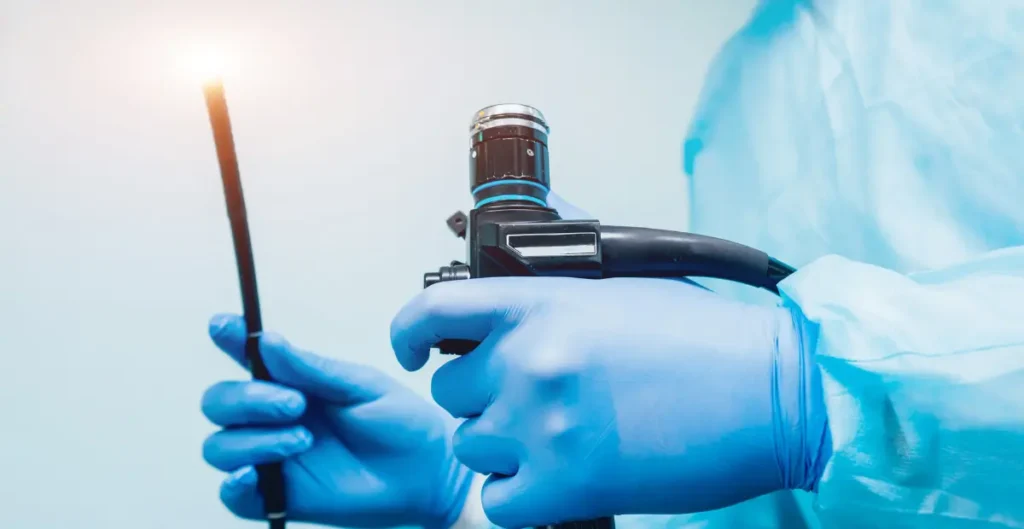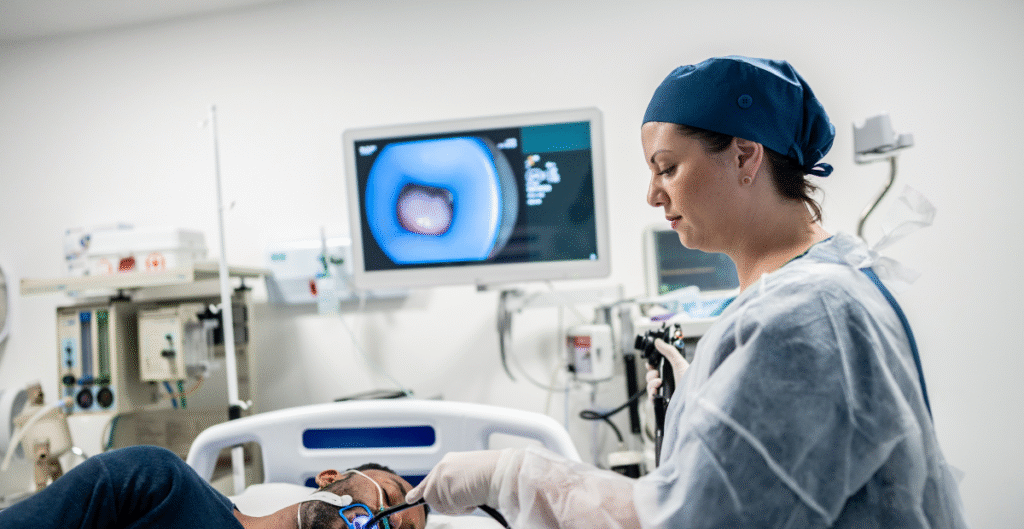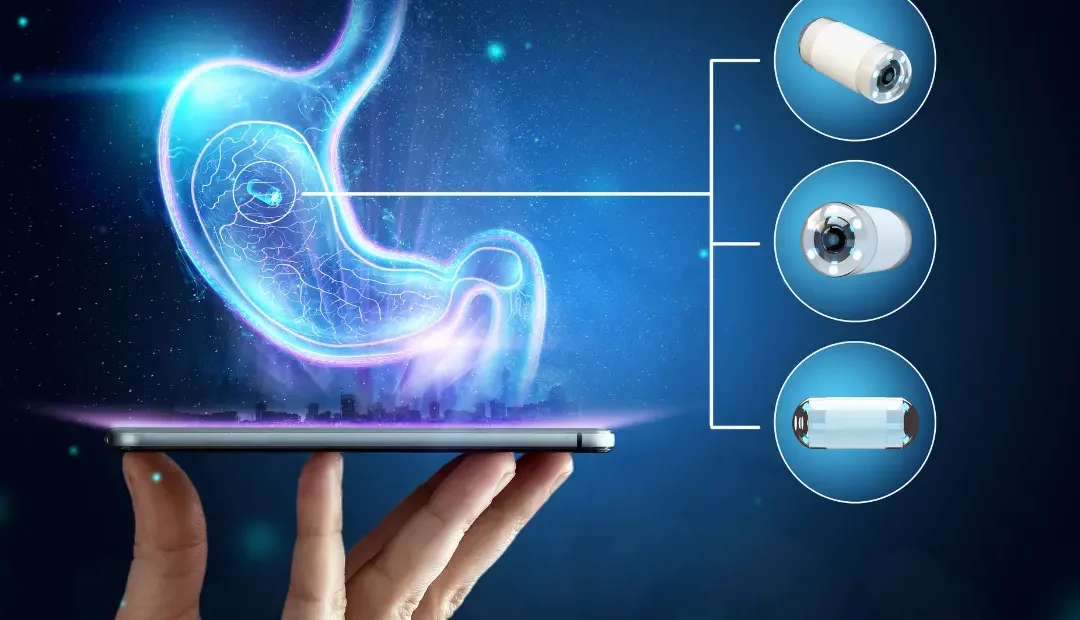- What Is Endoscopy?
- Why Is Endoscopy Done?
- Types of Endoscopy Procedures Available in Chennai
- How to Prepare for Endoscopy
- Is Endoscopy Painful?
- How Safe Is Endoscopy?
- How Long Does It Take to Recover After Endoscopy?
- Endoscopy Cost in Chennai
- Best Hospitals for Endoscopy in Chennai
- Endoscopy for Gastric Problems
- Can Endoscopy Detect Cancer?
- Endoscopy vs Ultrasound – Which Is Better?
- Endoscopy for Elderly and Children
- Liquid Diet Before Endoscopy
- Endoscopy Results and Reporting Time
- Can You Eat Before Endoscopy?
- When to Consult a Doctor for Endoscopy
- Diet After Endoscopy
- Can Endoscopy Be Avoided?
- Myths and Facts About Endoscopy
- Endoscopy in Chennai – Final Thoughts
- Frequently Asked Questions
Endoscopy in Chennai is one of the most commonly recommended diagnostic procedures for patients suffering from unexplained stomach pain, acidity, indigestion, vomiting, or suspected ulcers. If your doctor has advised an endoscopy, it is normal to feel anxious or curious about what it really involves. Many people worry about pain, safety, cost, or how long the procedure will take. This complete guide will help you understand everything about endoscopy in Chennai so that you feel confident and prepared before undergoing the test.

What Is Endoscopy?
Endoscopy is a medical examination where a thin, flexible tube with a tiny camera attached at the end, known as an endoscope, is inserted through the mouth to view the food pipe, stomach, and upper part of the small intestine. This helps doctors visually detect issues such as gastritis, ulcers, inflammation, polyps, internal bleeding, infections, or even early-stage cancers. Unlike traditional scanning methods like ultrasound or X-ray, endoscopy provides a direct and clear view of internal organs, making diagnosis highly accurate.
Why Is Endoscopy Done?
Doctors usually prescribe endoscopy for conditions such as persistent acidity, bloating, unexplained weight loss, difficulty swallowing, prolonged nausea or vomiting, black stools indicating bleeding, suspected ulcer, or after abnormal results in other tests like ultrasound or CT scan. Apart from diagnosis, endoscopy is also used for treatment purposes like removing polyps, controlling bleeding, or taking tissue samples (biopsy) for further testing.
Types of Endoscopy Procedures Available in Chennai
Different types of endoscopy procedures are available depending on the area being examined. The most common one is Upper GI Endoscopy (Gastroscopy), where the esophagus, stomach, and duodenum are inspected. Colonoscopy is used to examine the large intestine through the rectum, while Sigmoidoscopy examines the lower part of the colon. There are also special procedures like Endoscopic Ultrasound (EUS), Endoscopic Retrograde Cholangiopancreatography (ERCP) for bile duct and pancreas issues, and Capsule Endoscopy where a swallowable camera capsule captures images throughout the digestive tract.

How to Prepare for Endoscopy
Proper preparation is crucial for getting accurate results. Your doctor will advise you to fast for at least 6 to 8 hours before the procedure. This ensures that the stomach and food pipe are empty for clear visibility. Avoid smoking and alcohol the previous day. Inform your doctor about any ongoing medicines, especially blood thinners, diabetes medications, or heart tablets. If biopsy or polyp removal is expected, certain medications may be temporarily stopped. If you have health conditions like asthma, heart disease, or pregnancy, additional precautions may be taken.
Is Endoscopy Painful?
Most patients worry about pain, but endoscopy is generally painless. A numbing spray is applied to the throat to prevent discomfort, and mild sedation is given to help you relax. You may feel slight pressure or gagging for a few seconds, but it is not painful. The entire procedure takes only around 10 to 15 minutes. Afterward, you may experience mild throat irritation, but it goes away within a few hours.
How Safe Is Endoscopy?
Endoscopy is considered extremely safe when performed by experienced specialists. Complications like bleeding or infection are rare and occur in less than 0.1% of cases. Choosing the best endoscopy doctor in Chennai ensures a smooth and risk-free experience with advanced equipment and expert care. Most people return home the same day within 2 to 3 hours of observation.
How Long Does It Take to Recover After Endoscopy?
Recovery is quick, and you can resume normal activities on the same day. However, since sedation is used, it is recommended not to drive or operate machines for 24 hours. Start with soft foods and avoid spicy or oily meals immediately after the procedure. Drinking warm water or herbal tea can help soothe the throat.
Endoscopy Cost in Chennai
The cost of endoscopy in Chennai varies depending on the hospital, type of endoscopy, and whether biopsy or additional treatment is performed. On average, Upper GI Endoscopy ranges between ₹3,000 to ₹7,000. Colonoscopy can cost between ₹8,000 to ₹15,000. If advanced procedures like ERCP or EUS are required, it may range from ₹20,000 to ₹40,000. Many health insurance plans cover diagnostic endoscopy if recommended by a registered specialist, so it is advisable to check coverage beforehand.
Best Hospitals for Endoscopy in Chennai
Several reputed hospitals offer endoscopy services in Chennai, but the most important factor is choosing an experienced specialist. Government hospitals provide affordable options, while private hospitals offer advanced equipment and better comfort. For precise diagnosis, personalized attention, and expert handling, many patients prefer consulting a leading endoscopy specialist in Chennai who ensures safe and accurate results with minimal discomfort.
Endoscopy for Gastric Problems
Endoscopy is most commonly done for gastric issues like hyperacidity, chronic reflux, gastritis, ulcer, or H. pylori infection. If you constantly rely on antacids or proton pump inhibitors (PPI tablets), your doctor may suggest endoscopy to find the root cause. Biopsy samples taken during the procedure can confirm infections like H. pylori, helping in targeted treatment.
Can Endoscopy Detect Cancer?
Yes, endoscopy plays a major role in detecting early signs of stomach or esophageal cancer. If suspicious growths or lesions are seen, a biopsy is taken immediately. Early detection through endoscopy helps in successful treatment and survival. Regular screening is advised for people above 50 years or those with a family history of cancer.
Endoscopy vs Ultrasound – Which Is Better?
Many patients ask why endoscopy is needed when ultrasound can show stomach issues. The reason is that ultrasound is an external imaging test and cannot always detect inflammation, minor bleeding, or small ulcers inside the stomach. Endoscopy directly visualizes the internal surface, giving more accurate results. Your doctor may first do an ultrasound and then suggest endoscopy only if necessary.
Endoscopy for Elderly and Children
Endoscopy is safe for elderly people as long as proper precautions are taken. Pediatric endoscopy is also done for children with severe gastric issues, food allergies, or swallowing difficulties. Special pediatric scopes and mild sedation techniques ensure safety and comfort. Always choose a trusted endoscopy clinic in Chennai if you need the procedure for a child or senior citizen.
Liquid Diet Before Endoscopy
Doctors usually recommend a light, easily digestible meal the day before the procedure. You may be asked to have only clear liquids like coconut water, lemon juice without pulp, rice water, or vegetable broth. Avoid milk, fruit juices with pulp, heavy meals, or coffee. Solid food should be avoided after midnight before the test.
Endoscopy Results and Reporting Time
In most cases, the doctor will inform you of the findings immediately after the procedure. If biopsy samples were taken, it may take 2 to 5 days for the lab report. Based on the diagnosis, proper treatment will be started. If infection or ulcer is found, medicines are given. If polyps are detected, further treatment may be advised.
Can You Eat Before Endoscopy?
No, you must avoid eating or drinking for 6 to 8 hours before endoscopy. This is to prevent food particles from obstructing the view and to avoid vomiting during the procedure. Water may be allowed up to 2 hours before, depending on your doctor’s instructions.
When to Consult a Doctor for Endoscopy
If you have persistent acidity, black stools, difficulty swallowing, frequent vomiting, or unexplained weight loss, you should consult a gastroenterologist. Do not ignore these symptoms, as they may indicate serious conditions. You can book an appointment with an expert gastroendoscopy doctor in Chennai to get accurate diagnosis and treatment.
Diet After Endoscopy
Stick to soft and bland food after the procedure. You can start with idli, kichadi, curd rice, dal rice, porridge, or boiled vegetables. Avoid fried snacks, spicy curries, cold drinks, and alcohol for a day. Drink plenty of warm water.
Can Endoscopy Be Avoided?
In some cases, non-invasive tests like ultrasound, CT scan, or stool tests may provide sufficient information. But if symptoms persist or initial tests are inconclusive, endoscopy becomes essential. It is always better to get a clear diagnosis rather than guessing.
Myths and Facts About Endoscopy
Many people believe that endoscopy is painful or dangerous, but this is false. Modern techniques and sedation make it simple and quick. Some think it is only for older people, but even youngsters with gastric issues may need it. Another misconception is that endoscopy is only for diagnosing cancer, but it is mainly used for common conditions like acidity or gastritis.
Endoscopy in Chennai – Final Thoughts
Endoscopy in Chennai is a safe, effective, and highly reliable procedure for diagnosing and treating various digestive issues. With advanced equipment and skilled specialists, patients can undergo the test comfortably and return home the same day. If you are looking for expert guidance and precision care, you can consult the best endoscopy doctor in Chennai to ensure accurate diagnosis and compassionate treatment throughout your journey to recovery. Reach Us
Frequently Asked Questions
- How long does endoscopy take?
The actual procedure takes only 10 to 15 minutes, but including preparation and recovery, you may spend around 2 to 3 hours at the hospital. - Can I go home after endoscopy?
Yes, it is a day-care procedure. You can go home the same day after a short observation period. - Is sedation necessary for endoscopy?
Sedation helps you stay relaxed and comfortable. Most doctors recommend it, but in rare cases, it can be done without sedation. - Can endoscopy detect infection?
Yes, biopsy samples taken during endoscopy can help detect infections like H. pylori or fungal infections in the stomach.

